Hamish McLachlan: Mick and Jack Doohan on racing and life on the motorsport fast track
MOTORBIKE champion Mick Doohan knows all about chasing a dream — and winning races. With son Jack looking to emulate his dad’s success, they talked to Hamish McLachlan about life on the fast track.
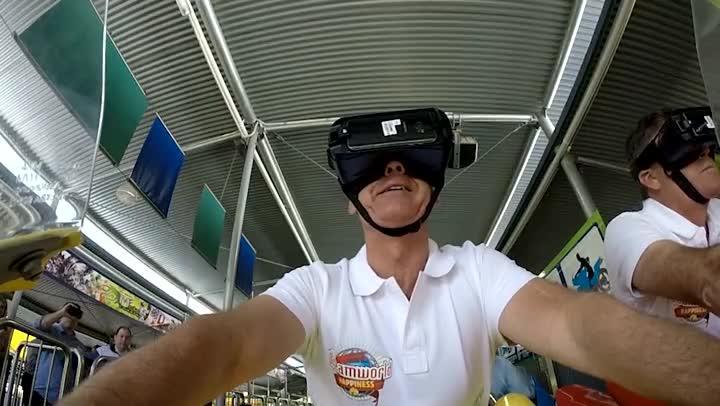
VIC News
Don't miss out on the headlines from VIC News. Followed categories will be added to My News.
MICK Doohan used to ride a motorbike so fast he won five consecutive 500 cc (MotoGP) World Championships in the mid 90s. He has bred the desire to go fast into his 14-year-old son Jack. He is looking to emulate his dad’s success, albeit on four wheels. Mick relocated the family from Queensland to France at the start of the year so Jack could immerse himself in the world of kart racing and chasing his Formula 1 dream. The move is generating results. I spoke to them both about the perils of motorsport, almost losing a leg and how you make a piece of machinery go faster than your competitor.
HM: Father and son on one call …. where do I find you?
MD: We’re sitting in Monaco at the moment. Jack has a race next week up in the UK, which is a feeder race before the world championship event up in the UK in September. That’s the end of the official karting season. After that, there’s some races in Italy, and perhaps a bit of car testing for him!
HM: Jack, you’ve fallen in love with going fast. Why on four wheels, and not two?
JD: I did ride motorbikes like dad when I was younger, but I broke my leg on my fifth birthday on a Pee Wee 50! That got me a little scared, so I started doing BMX, and stuck to the pushbikes. I did that for two years. Now, I’m always on a dirt bike when I’m at home, but I’ve never had the desire to do it professionally. I started racing in go-karts when I was 8.
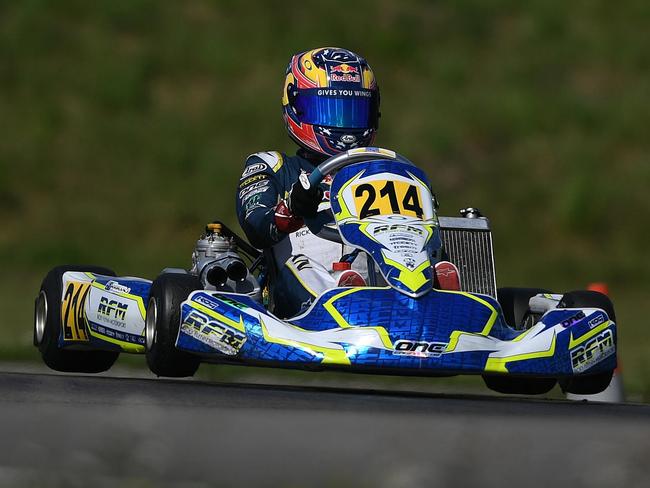
HM: The Doohan’s have a habit of breaking legs it seems! Isn’t it just safer to stay on the bikes?
MD:(laughs) It is! Unfortunately, whenever you make a mistake on motorcycles you end up on your backside at speed, at that can lead to breaks. As Jack mentioned, he does ride dirt bikes around the paddock and messes around on them at home, but I don’t think he’s ever been inspired to go out there and actually make a career out of it. He’s never asked me to go and do a race. He was in a kart from a young age, even before he was interested in racing them, so I think that’s helped him head off in that four-wheel direction. I mess around in karts quite often as well, so I think he just followed me in that regard, and has fallen in love with it.
HM: Mick how close were you to losing your leg from the crash in 1992?
MD: Very close actually. Thankfully, Doctor Claudio Costa, an Italian doctor, was able to come and retrieve me from Holland. The doctors in Holland were close to amputating my leg, perhaps in the next 24 hours. I wasn’t aware of how dire it was until I was lying in air ambulance and flying out of there. I was fortunate enough that I had a doctor that was concerned that amputation wasn’t the right thing to be doing, and as a result he did save my leg.
HM: Were you always going to ride again after the fall?
MD: I’d never given up the desire to want to race, but clearly it wasn’t going to happen had I lost my leg. I lost the use of my right ankle, which was huge, so it was always a question of how competitive I could get myself back to being. I never gave up on that mentality, even with a slight disability, and having to redesign where I activated the rear brake from. Normally you use the rear brake with your right foot, I moved it up to the left hand so I could still activate it, but with my thumb. I had to move around the bike a little bit more awkwardly than I would with two good ankles, but I was able to overcome that and just keep pushing through until I was able to win again.
It was a pretty dark time to be honest, because my leg was infected, and I had the bone infection for the best part of twelve months. I was just trying to get everything back on track to chase my dream, which was winning the World Championship. Twelve months isn’t that long in the scheme of things, but it’s twelve months spent not knowing whether the leg was going to heal properly, and not knowing whether I would regain that competitive streak.
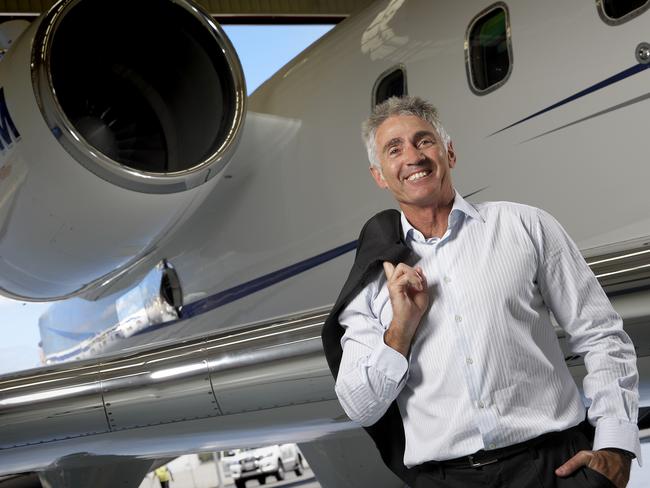
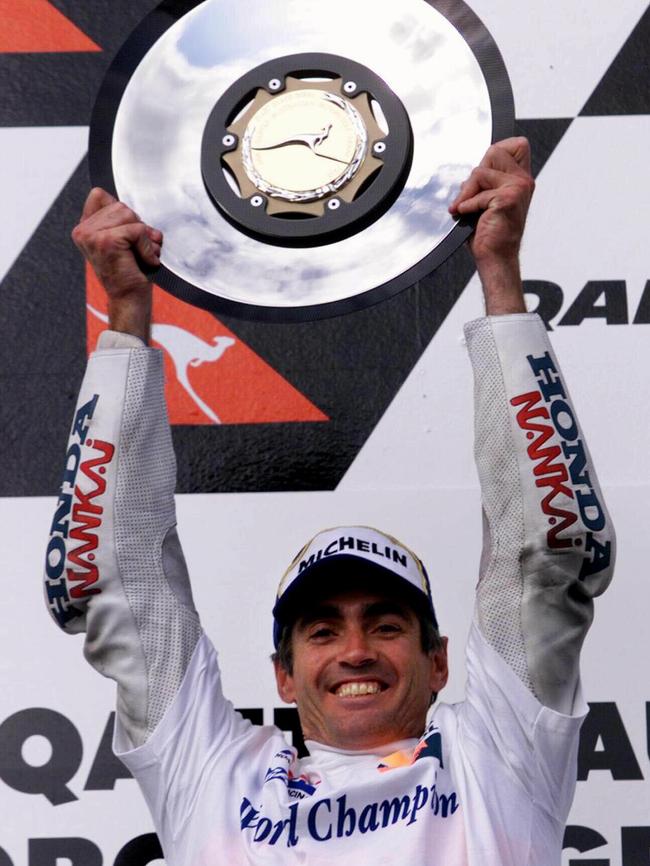
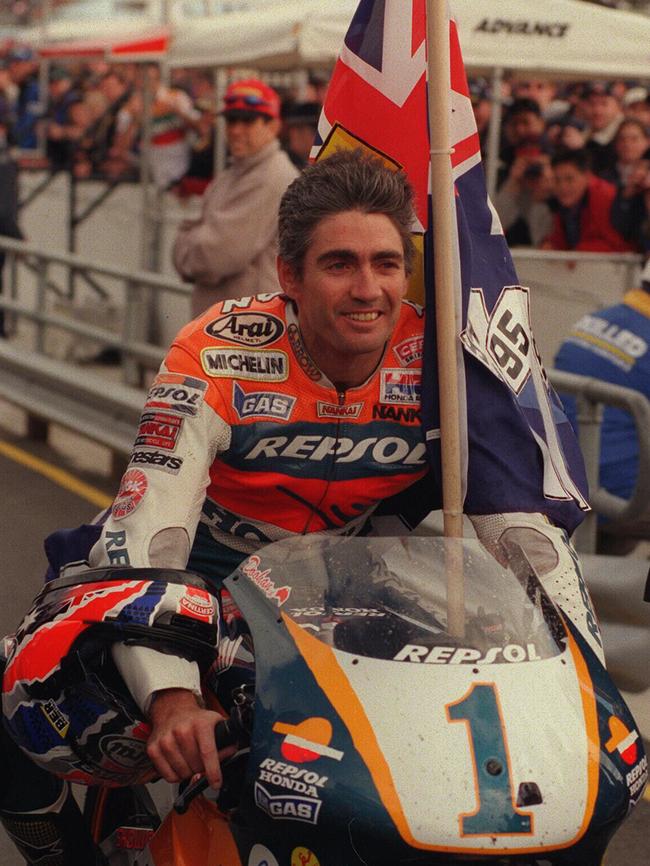
HM: You almost lost your leg, but within a few years later you won your first of five consecutive World Championships. What changed that allowed you to be so dominant?
MD: When I came to Europe, there was only one goal, and that was just to win races. How many world titles I won didn’t really come into it. Winning one was all I really wanted to do at that point in time. After some success, it got to a point of just wanting to win every race. If you win race after race, the points add up, and you end up winning championships as well. So nothing really changed, I just got a good run at it on the right bikes and got more and more confident, and that breeds success.
HM: Five consecutive World Championships — why can one individual get a car, or a bike, to go consistently quicker than somebody else can?
MD: It’s a combination of things I think, Hamish. I suppose it’s the same with what you’re doing now — you’re trying to write a piece better than somebody else. In so many areas, it’s about the way you apply yourself and the want to be better than the next person. With bike racing you need to be fit so you can maintain your mental focus. It’s about building confidence within yourself, which you realise is a purpose of why you train, training to better than your competitor. Some of those training sessions are quite long, so you have time to think about why you’re training, and what you want to be doing out of the circuit.
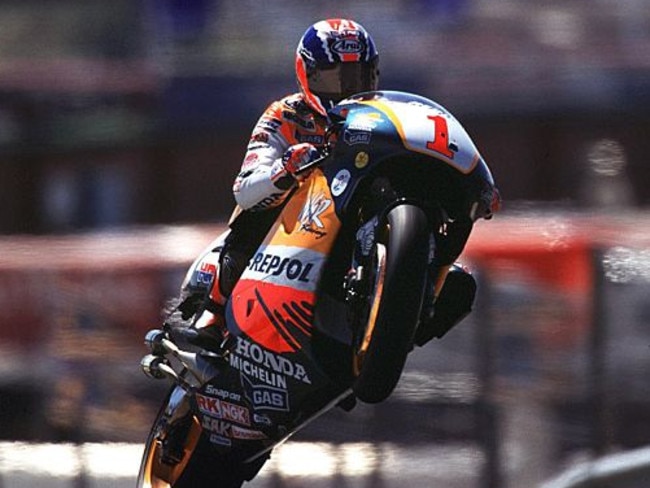
HM: Jack?
JD: I think it’s mainly about the mindset. It’s about how someone thinks about something, and what they do differently. It could be about how they train, or they might just want it more than everyone else.
HM: It seems you are a rare breed in that you are an individual in a team sport.
That’s right — if you win or lose, it’s not just you, you’re with a team. You are collectively always trying to build a better package so you can get out there, be more competitive, and beat the other guys more easily than you had previously. As with so much in life, the little things make all the difference. There’s not a great deal of difference between somebody that finishes second, and somebody that finishes first. It’s that little bit of extra effort which makes you feel a hell of a lot better at the end of the day — and I think you will find that old adage is pretty true — the harder you work, the luckier you get.
HM: Jack you are learning the caper very quickly, and very young. What has your father taught you?
JD: He has made it very clear that it is important not to get cocky and always be modest. If you have a bad day, it’s about coming in and not crying, not showing any emotion, and just always maintaining a poker face, as Dad refers to it! Be humble, be grateful, work hard, and be appreciative.
HM: How old are you Jack?
JD: 14.
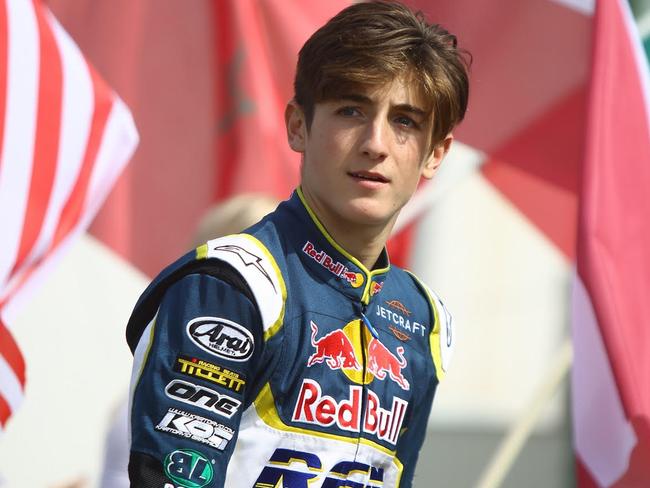
HM: A very wise 14. ……you moved to France when you were 13 — why?
JD: The home of karting is in Europe, it is Italy really, that’s where the season starts. You’re there for the first four rounds, and from there it spreads off around Europe. The most competitive country is Italy though, no doubt. France is a good place to base yourself and commute from.
HM: Your goal is to end up in a Formula 1 car?
JD: Yes, that is the main goal. It’s a long way away though! There’s only 20 drivers in the whole world right now competing in Formula 1, and there’s a lot of go-karters out there saying that they want to become a Formula 1 driver. I have to keep pushing at it and hope it comes.
MD: The main difference is you have the top people from every nation all in the one paddock! The depth of the field is a lot larger than it is at a national level, and I think that’s the same with every sport. It’s certainly the same with motorcycling. Jack was quick in Australia, but Jack’s had to come out here and fight a hell of a lot harder than he has previously. If there’s a small mistake he could lose ten spots, whereas in Australia, a small mistake may not have even cost him one! Half a second over here means you could drop to 40th, whereas if you drop half a second in Australia, you might still be in the top 5 or 10.
HM: Where are you finding yourself finishing at the moment, Jack?
JD: In the first half of the season I had two good results. I had a 2nd and a 3rd; one in the wet, and one in the dry. After that, I went through a patch where I wasn’t really confident for a while. Then we started working back on it, we started pushing me harder, and we started getting to it in the last three rounds of the European Championship. We were getting faster as a result. In the last two rounds I started off pole position for the final, and then in the last round I won the final! We were getting there bit by bit. Now, we seem to be there, but we’ve still got to work harder for the World Championships.
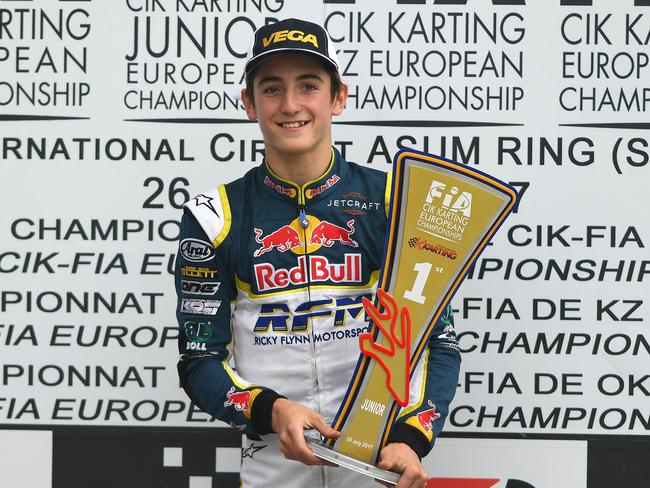
HM: How do you work on the mental side of racing and how do you build your confidence?
JD: Dad has always been really good to me with that. Ever since I started, it’s always been about keeping my emotions in check, and about focusing on the first lap. I don’t know if Dad’s always taught me how to be the best mentally, but he’s just always taught me about having that poker face, as I mentioned earlier. It’s about showing no emotion and now allowing your emotions to fluctuate and be moved by wins and losses. It’s a long process!
MD: It’s a very long process which involves little ideas here and there. It’s about the way he approaches things. From there, it’s about seeing the way he operates, and then trying to adjust him piece by piece. Jack adapts pretty well to all of that. I try and sit back as much as I can, but he picks up on things pretty quickly. With all that said, Jack’s doing a great job by himself, and if you give him a little bit of information, at least he absorbs it, and then tries to improve from there. He’s doing a great job.
HM: How are you finding combining semi-professional sport with school, Jack?
JD: It is an adjustment — I am having to be home schooled! We try and do as much of the schooling as we can, with the schedule we have.
MD: His teachers come to the house when we’re actually here, but when we’re away, they do it over Skype! His schooling is going quite well, but it has to be flexible because he’s on the road so often.
HM: How long before you know that you are going in the right direction, and there’s a future in racing?
MD: A while. This year was really to come and see if Jack has the desire to want to push and continue on further in a motorsport career. Even though he’s so young and so many things can change, from the outset of being here he has grown so much as a driver. He’s actually enjoyed the lifestyle change, and adapted very well. As far competition out here, the European Championship is over five rounds, with four heat races in each round, and one final. There’s twenty heat races, and five finals. He had one poll position, won eight of the heats and one of the finals. That’s 9 of the 25 races in total!
He’s heading in the right direction, and he’s pretty much dominated even though he didn’t win it. That was, in a way, because he didn’t have the experience in the beginning. By the end of the championship he’d stopped making those mistakes he had made earlier, and because of that, he started doing really well. Now, the next step is car racing, which he’ll commence next year in F4. That’s another step, and I guess for Jack, he’s going to have to make it up for himself. Once he gets there, does he enjoy it as much as karting? Is it really the way he wants to go? It’s really going to be the decider for him. He will have to decide whether that is the direction he wants to go. To answer your question in three words — time will tell.
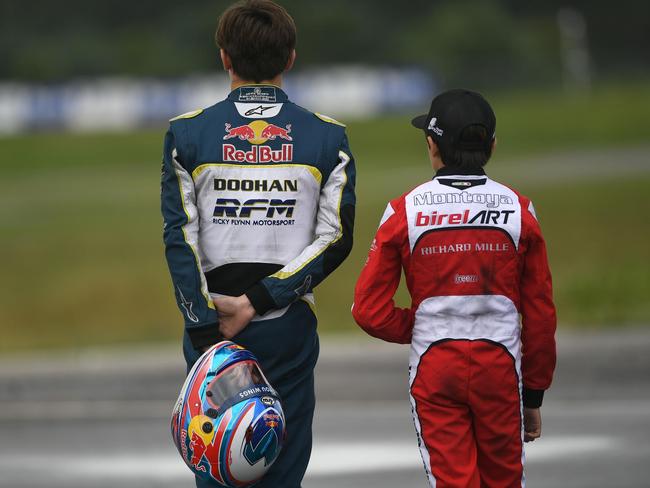
HM: What do you enjoy most about racing, Jack?
JD: The competition, and the fact that you have to work harder than everyone else to be the best. I love trying to one-up your opponents, and striving to always be better than the next competitor.
HM: Are you really only 14?
JD: Yes — 14.
MD: I think the other thing about this journey for Jack out here is that it’s a life skill that he can take on beyond this, regardless of whether he’s actually fortunate enough to make it as a professional car racer. I guess he already is, really! He’s going to take away three or four years of working and dealing with teams, and solving problems on and off the track. It’s going to develop him as a young man, and put him in a good position going forward in life. It’s beyond about being over here and driving around in a go-kart. It’s a completely different opportunity for him as well.
HM: You seem to be learning a lot of life lessons, Jack?
JD: I think so, yeah. Basically it’s all about becoming a young man quickly and dealing with all of the different problems better than anyone else is dealing with them.
HM: Very early!
MD: There’s many, many life lessons in what he’s doing. Dealing with the highs and lows of sport, dealing with a bigger team, dealing with individuals, and learning how to get the best out of them. He’s learning how to solve a lot of day to day issues, and it’ll put him in a much better position as an adult going forward in life.
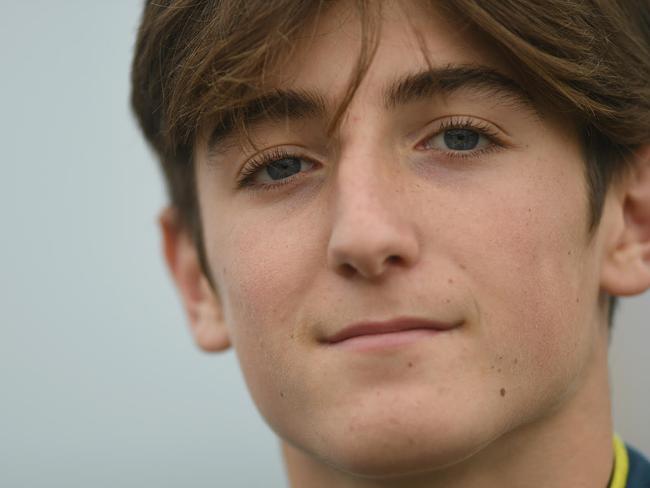
HM: Mick, how much of what you went through is relevant to Jack’s journey now?
MD: Some of it is relevant. Whether it’s on two wheels, or four wheels, it’s much the same. Motorsport is motorsport, and applying yourself is very similar. Really, beyond that, all I can do is just try and be his dad, and that’s what I try and do most of the time anyway. I help him try and achieve his goals, but they’re his goals, and he’s the one that has to push for them. I can’t keep him away from a racetrack, and I can’t keep him out of a go-kart! So it’s not like I’ve got to push him, or wake him up to get going, or encourage him to get out onto the track. That’s all he wants to do anyway. He’s certainly got the right mindset to want to go on, and those similarities remain the same now as they have always in motorsport.
HM: How many days a year are you either driving for practice, or racing competitively in Europe now?
JD: I think all up there would be 140 days that I’m either in a kart or a car. There’s a good third of the year of actual in car time. After you throw travel and whatever else into it, you’re pretty much spending half a year on the road!
HM: Jack, what’s the quote you live by that I found on your website?
JD: “We all fall, but it’s the ones that rise back up, that make the difference”.
HM: Where did you find that?
JD: I just thought of it I guess!
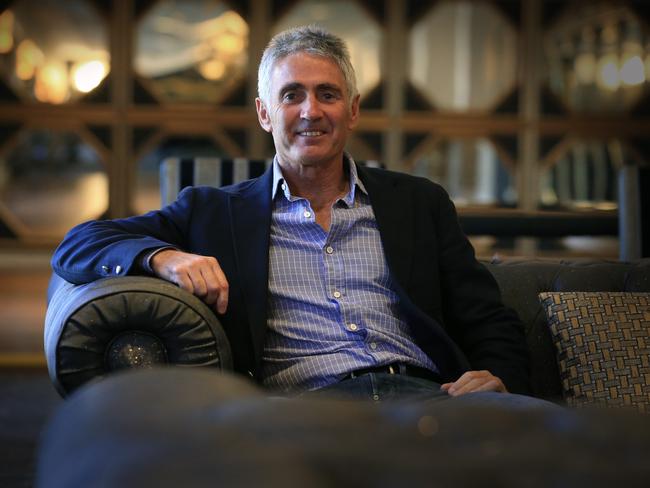
HM: Mick, you used to take off on the bike into the scrub. Was your mum a supporter, or terrified of what you were doing?
MD:(laughs) I think initially terrified, but also a supporter. My brothers and I used to take off into the scrub, dirt biking. That’s when mum got us racing, and we were eventually put into a circuit environment. Mum was happy because there was an ambulance, and there were a few people who could keep an eye on what we were actually doing. Then it just went from there, and we were pretty much racing every weekend from a young age.
HM: I assume that’s the same with Jack. He’s going to race, he’s going to tear about, but you’ve got him in the safest environment you can have him in for what he’s doing.
MD: Definitely, but there’s always danger in sport. Football has its problems, as does every other sport. I wasn’t disappointed that he wanted to race karts over motorcycles, put it that way!
HM: Guys, it’s been really nice to speak with you. Mick, it was a great career that I enjoyed watching, and Jack, hopefully yours turns out to be just as successful.
MD: Thanks Hamish.
JD: Thank you.


